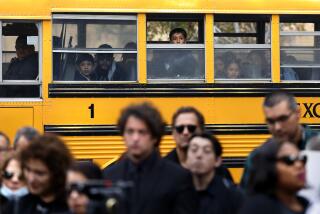Gen Y’s ego trip takes a bad turn
- Share via
No wonder YouTube is so popular.
All the effort to boost children’s self-esteem may have backfired and produced a generation of college students who are more narcissistic than their Gen X predecessors, according to a new study led by a San Diego State University psychologist.
And the Internet, with all its MySpace and YouTube braggadocio, is letting that self-regard blossom even more, said the analysis, titled “Egos Inflating Over Time.”
In the study being released today, researchers warn that a rising ego rush could cause personal and social problems for the Millennial Generation, also called Gen Y. People with an inflated sense of self tend to have less interest in emotionally intimate bonds and can lash out when rejected or insulted.
“That makes me very, very worried,” said Jean Twenge, a San Diego State associate professor and lead author of the report. “I’m concerned we are heading to a society where people are going to treat each other badly, either on the street or in relationships.”
She and four other researchers from the University of Michigan, University of Georgia and University of South Alabama looked at the results of psychological surveys taken by more than 16,000 college students across the country over more than 25 years.
The Narcissistic Personality Inventory asks students to react to such statements as: “If I ruled the world, it would be a better place,” “I think I am a special person” and “I like to be the center of attention.”
The study found that almost two-thirds of recent college students had narcissism scores that were above the average 1982 score. Thirty percent more college students showed elevated narcissism in 2006 than in 1982.
Twenge said she and her coauthors are not suggesting that more students today have a pathological narcissistic personality disorder that needs psychiatric treatment. Still, traits of narcissism have increased by moderate but significant amounts, said Twenge, who last year published a book titled “Generation Me: Why Today’s Young Americans Are More Confident, Assertive, Entitled -- and More Miserable Than Ever Before.”
The narcissism report is under review for publication in a scholarly journal, which would give it the stamp of academic recognition it now lacks.
It was released, Twenge said, in connection with the upcoming paperback edition of her book and with a student affairs workshop today at the University of San Diego at which she and another speaker will discuss how today’s college students approach education.
Some of the increase in narcissistic attitudes was probably caused by the self-esteem programs that many elementary schools adopted 20 years ago, the study suggests. It notes that nursery schools began to have children sing songs that proclaim: “I am special, I am special. Look at me.”
Those youngsters are now adolescents obsessed with websites, such as MySpace and YouTube, that “permit self-promotion far beyond that allowed by traditional media,” the report says.
Other trends in American culture, including permissive parenting, increased materialism and the fascination with celebrities and reality TV shows, may also heighten self-regard, said study coauthor W. Keith Campbell, psychology professor at the University of Georgia. “It’s part of a whole cultural system,” he said.
The researchers seek to counter theories that current college students are more civic-minded and involved in volunteer activities than their predecessors. Because many high schools require community work, increases in volunteering “may not indicate a return to civic orientation but may instead be the means toward the more self-focused goal of educational attainment,” the report says.
An annual survey of U.S. college freshmen by the Higher Education Research Institute at UCLA has found growing interest in public service and social responsibility, presumably in response to Hurricane Katrina and other disasters around the world.
But that survey also showed that current freshmen are much more interested in financial success and less in “a meaningful philosophy of life” than students were in the 1970s.
At Cal State Long Beach on Monday, an informal survey produced divided opinions about Gen Y personality traits.
Students and teachers said they often see examples of inflated egos on campus: students who converse in the computer center while others are trying to concentrate, preen in front of the reflecting windows of the economics building or expect good grades simply for showing up at class.
Laura Rantala, 26, a sociology major, said the phenomenon got in the way of a survey she conducted last semester on the attitudes of men and women about jury duty.
“It took about three minutes to complete the survey,” she recalled. “But many students were so self-absorbed they didn’t want to participate.
“I think it’s because we all have our own cellphone and iPod with which we’re doing our own thing in our own little world,” she mused.
Some students seeking degrees in finance and management said, however, that they had good reason to stress confidence and esteem.
James Coari, a lecturer in the College of Business Administration, agreed, to a point. In an interview in his office, Coari said, people looking for jobs “have to be concerned about image because competition is fierce.”
Marc Flacks, an assistant professor of sociology, said that he believed that narcissism was too harsh a description for current students and that it was more important to discuss why “we have a society in which narcissistic behavior is a good quality to have.”
“This is a bottom-line society, so students are smart to seek the most direct route to the bottom line,” he added. “If you don’t have a me-first attitude, you won’t succeed.”
Flacks summed up the attitudes he often encounters in students, who expect a tangible payoff from their education:
“The old model was a collegial one in which students and professors alike sought knowledge for knowledge’s sake. The new model is ‘I paid my money, give me my grade and degree.’ It makes me want to ask [students], ‘Want fries with that order?’ ”
*
louis.sahagun@latimes.com








